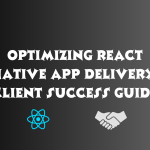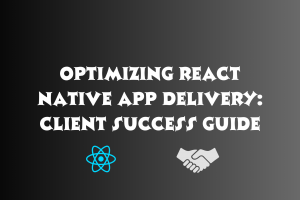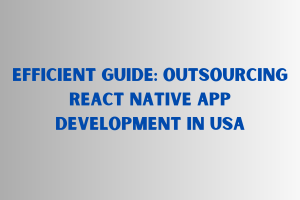React Native is an open-source mobile app development framework created by Facebook in 2015. It allows developers to build native apps for Android and iOS using JavaScript. React Native has become increasingly popular in recent years, due to its many advantages, such as cross-platform development, fast development times, and a large community.
However, it is important to consider both the pros and cons of React Native before choosing to use it for your next mobile app project.
Benefits of using React Native for mobile app development
Cross-platform development:
React Native allows you to develop mobile apps for both iOS and Android using a single codebase. This can save you a significant amount of time and money, as you don’t need to hire separate teams to develop native apps for each platform.Fast development:
React Native is a very fast and efficient mobile app development framework. This is because it uses JavaScript, which is a very popular and widely used programming language.Large community:
React Native has a large and active community of developers. This means that there is a wealth of resources available to help you learn React Native and develop your app.Wide range of libraries:
There is a wide range of libraries available for React Native. This means that you can find libraries for almost any functionality that you need for your app.
Why is it important to consider the pros and cons of React Native before choosing to use it for your next mobile app project?
It is important to consider the pros and cons of any technology before choosing to use it for your project. React Native is no different.
By understanding the advantages and disadvantages of React Native, you can make an informed decision about whether it is the right framework for your project.
Pros of React Native
Cross-platform development
One of the biggest advantages of React Native is that it allows you to develop mobile apps for both iOS and Android using a single codebase. This can save you a significant amount of time and money, as you don’t need to hire separate teams to develop native apps for each platform.
It also means that you can get your app to market faster, as you only need to develop and maintain a single codebase.
Fast development
- React Native is a very fast and efficient mobile app development framework. This is because it uses JavaScript, which is a very popular and widely used programming language.
- React Native also uses a number of performance optimizations, such as native components and a bridge to communicate between the JavaScript and native code.
As a result, React Native apps can be just as fast and performant as native apps.
Large community
React Native has a large and active community of developers. This means that there is a wealth of resources available to help you learn React Native and develop your app.
There are many online tutorials, articles, and books on React Native development. There are also many open source libraries and components available for React Native.
Wide range of libraries
There is a wide range of libraries available for React Native. This means that you can find libraries for almost any functionality that you need for your app.
For example, there are libraries for navigation, user interface elements, data storage, and networking. This can save you a lot of time and effort, as you don’t have to develop everything from scratch.
In addition to the pros listed above, React Native also offers a number of other benefits, such as:
Hot reloading:
React Native allows you to see changes to your code reflected in the app immediately, without having to rebuild and reinstall the app. This can save you a lot of time and effort during development.Native user interface:
React Native uses native components to render the user interface of your app. This means that your app will look and feel like a native app.Third-party libraries:
There are many third-party libraries available for React Native, which can extend the functionality of your app. For example, there are libraries for social media integration, analytics, and payments.
Cons of React Native
Performance
One of the main concerns about React Native is its performance. React Native apps are generally not as performant as native apps. This is because React Native apps use a bridge to communicate between the JavaScript and native code.
However, the performance difference is usually not noticeable for most apps. In addition, the React Native team is constantly working to improve the performance of React Native apps.
Complexity
React Native can be a bit complex to learn, especially if you are not already familiar with JavaScript. However, there are many resources available to help you learn React Native, and the learning curve is not as steep as it once was.
Limited support for some features
React Native does not support all features of native iOS and Android apps. However, the list of supported features is constantly growing.
If you need to use a feature that is not supported by React Native, you may need to write native code. This can add complexity and cost to your project.
Other cons
In addition to the cons listed above, React Native also has a few other drawbacks, such as:
Debugging:
Debugging React Native apps can be more difficult than debugging native apps. This is because React Native apps use a bridge to communicate between the JavaScript and native code.App size:
React Native apps can be larger than native apps. This is because React Native apps include a JavaScript runtime and a bridge to communicate between the JavaScript and native code.Maturity:
React Native is a relatively new technology, and it is still evolving. This means that there are some bugs and issues that you may encounter.
Overall, React Native is a powerful and versatile mobile app development framework. However, it is important to be aware of the limitations of React Native before choosing to use it for your next mobile app project.
Comparison to other frameworks
React Native vs. Flutter
- Flutter is a cross-platform mobile app development framework created by Google in 2017. It is similar to React Native in that it allows developers to build native apps for Android and iOS using a single codebase.
- However, Flutter uses a different programming language than React Native. Flutter uses Dart, which is a newer language developed by Google.
- Another key difference between React Native and Flutter is that Flutter renders its own user interface, while React Native uses native components. This means that Flutter apps can have a more consistent look and feel across different platforms.
React Native vs. Xamarin
- Xamarin is a cross-platform mobile app development framework created by Microsoft in 2011. It allows developers to build native apps for Android and iOS using C#.
- Xamarin is a good choice for developers who are already familiar with C#. It is also a good choice for developers who need to access native APIs or develop high-performance apps.
- However, Xamarin can be more complex to learn than React Native or Flutter. It is also important to note that Xamarin is not free.
React Native vs. Ionic
- Ionic is a cross-platform mobile app development framework that uses web technologies, such as HTML, CSS, and JavaScript. This means that developers can use their existing web development skills to build mobile apps.
- Ionic is a good choice for developers who want to build simple mobile apps quickly and easily. However, it is not a good choice for developers who need to develop high-performance apps or access native APIs.
Conclusion
React Native is a powerful cross-platform mobile app development framework that offers many advantages, such as cross-platform development, fast development, a large community, and a wide range of libraries. However, it is important to be aware of the limitations of React Native, such as its performance and limited support for some features.
Overall, React Native is a good choice for developers who want to build native apps for Android and iOS using JavaScript. It is a fast and easy-to-learn framework with a large community and a wide range of libraries. If you are considering developing a React Native app, GeekyAnts is a leading React Native development company that can help you with all aspects of your project, from ideation and design to development and deployment.
Please visit GeekyAnts to learn more, or contact us to discuss your project in more detail.

























